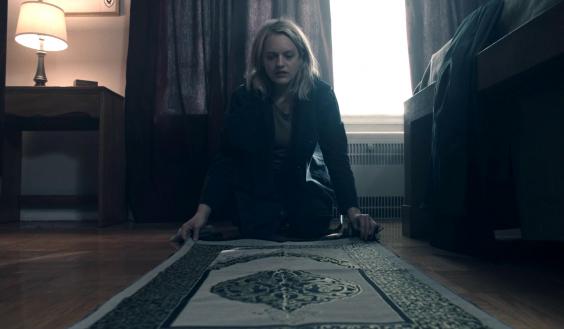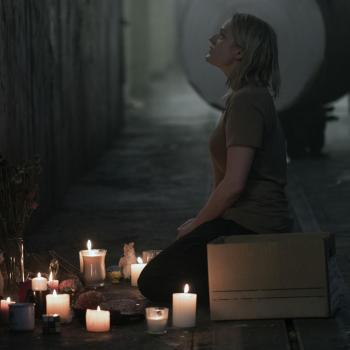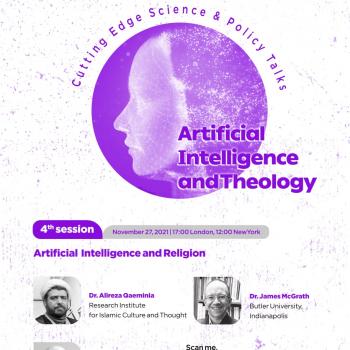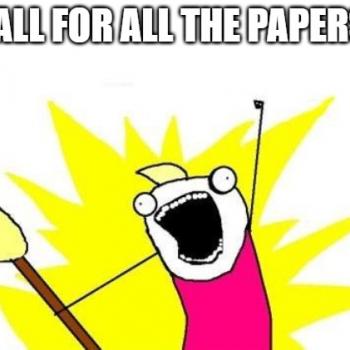The third episode of The Handmaid’s Tale is as profoundly religious as the previous one. In the details that it presents, as June tries to make her way to Canada, the show once again does something incredibly powerful. It tells a story of a white middle class American woman as first slave and then as displaced person seeking to become a refugee. Her experiences could be compared to the Underground Railroad, a form of which we learn has emerged to provide a way for people to flee Gilead’s oppressive regime. But one need not reach back into the past to find important analogies. As she adjusts to living in an abandoned building on her own, the site of an atrocity, she illustrates the resilience of modern-day refugees whom many Americans are happy, indeed eager, to condemn to a similar experience, closing our hearts and our borders to their plight. The waiting, the uncertainty, the comfort found even in temporarily stable accommodations, the need to be ready to forsake them at a moment’s notice – all those too are not some fictional imaginative speculation about what could be, but draws directly on what is, right now, as you read this, in multiple parts of the world.
The Handmaid’s Tale is thus prophetic, in the sense that it paints a vision of the future that is in fact a warning to avoid that future, and primarily a critique and challenge to the present day.
 As June makes her way to an airfield where she has been told she can meet someone who will take her to Canada, she instead is almost left behind there when something goes awry. But the man in question shows compassion and takes her to his home – much to the concern of his wife for their own family’s safety. On Sunday, June asks whether they go to church, and the man says “I make a public profession of faith.” We discover what is behind this elusive way of putting it when June later hides under their bed, and there finds a Qur’an and a Muslim prayer mat hidden.
As June makes her way to an airfield where she has been told she can meet someone who will take her to Canada, she instead is almost left behind there when something goes awry. But the man in question shows compassion and takes her to his home – much to the concern of his wife for their own family’s safety. On Sunday, June asks whether they go to church, and the man says “I make a public profession of faith.” We discover what is behind this elusive way of putting it when June later hides under their bed, and there finds a Qur’an and a Muslim prayer mat hidden.
The episode repeats a phrase from the first season, “Better never means better for everyone,” which reminds us that, on the one hand, someone else loses when another gains; but on the other hand, that we can seek fair and equitable sharing together, rather than pursuing our own gain and advantage and not caring how it may harm others as we do so.
The show offers some poignant thoughts about motherhood, family, and activism, as it provides more of June’s backstory focused on her mother, who was a feminist activist who, on the one hand, was willing to suffer in standing against rape, or for a woman’s reproductive rights. At one point she tells June that she doesn’t think she should marry Luke. She is upset that she sacrificed for June and yet June seems to be “settling” for a job as editor at an academic publishing company. She says that the country is going down the tubes, and thus it is time to fight, not to play house. Later she adds, “Raise your daughter to be a feminist, and she spends all her time waiting to be rescued by men.”
Later, we see a flashback to Aunt Lydia giving a speech with accompanying slides about the Earth being a gift from God which humanity poisoned and squandered until we reaped consequences that we ought to have anticipated. We had seen that scene before. But this time it takes us further, and we discover that June saw her mother in one of the slides, working as a farmhand in the colonies. By the end of the episode, as June is trying to flee to Canada leaving her daughter Hannah behind, she better understands that her mother wanted what was best for her, and she forgives her for mistakes that she made in seeking that, even as she now hopes that Hannah will forgive her.
But as the plane she is in tries to take off, there is gunfire and she is reapprehended.
This episode does a lot of great things, exploring what it means to resist oppressive forces. June’s mother did that one way at an early stage. June herself does that now in another. The family that briefly gave her refuge did so in a different way again, as too did those who transported her. There is discussion of the relationship between bravery and stupidity, and in dire times like these the apparent indistinguishability between the two. And there is also a direct engagement with our tendency to think that only direct confrontation (and perhaps martyrdom as a result) is true resistance. When another woman says that she would sooner die than give up her own child that she had given birth to, June replies by saying, “I used to think that too.” There are different ways to resist, and working quietly and patiently work to undermine a totalitarian regime from within while secretly helping its victims is one of those ways. Whether one of these approaches to resistance is better than another is a question that the episode leaves ambiguous – and that seems appropriate, given that there is no clear way to answer a question of that sort. Which of the various forms of resistance against Hitler and Nazism in Germany before and during WWII, for instance, was “best”? On what grounds might one rank them?
The message of this episode is once again a profoundly religious one. One of those helping along the route that June hopes will lead to freedom says to her, “Go in grace, kid.” Another turns out to have been motivated by his secret Muslim faith. And that detail exposes the self-defeating character of religious theocracy of this sort. It seizes power and imposes conformity, but it does not make genuine converts. It thus encourages hypocrisy that is antithetical to and subverts any genuine faith that exists in connection with it. And it also encourages other visions of faith to find strength and resolve to persist and resist, in ways that will likewise eventually emerge as an opposing force to those in authority.
An approach that undermines piety of its own sort, and radicalizes and fosters opposition from those who do not subscribe willingly to the vision of piety being imposed, is inherently self-defeating. The religious message of The Handmaid’s Tale is thus a warning not only to everyone else, but also to religious conservatives, fundamentalists, and dominionists themselves as to why this course is not one they ought to want to pursue.
What is your response to this season and this series thus far?
Of related interest, see the recently-rediscovered interview by Zora Neale Hurston with the last surviving person who experienced being transported as a slave from Africa to North America.













